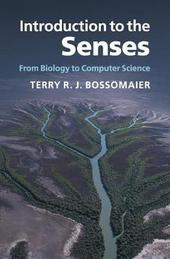
|
Introduction to the Senses: From Biology to Computer Science
Hardback
Main Details
| Title |
Introduction to the Senses: From Biology to Computer Science
|
| Authors and Contributors |
By (author) Terry R. J. Bossomaier
|
| Physical Properties |
| Format:Hardback | | Pages:358 | | Dimensions(mm): Height 254,Width 180 |
|
| Category/Genre | Human-computer interaction |
|---|
| ISBN/Barcode |
9780521812665
|
| Classifications | Dewey:612.80846 |
|---|
| Audience | | Tertiary Education (US: College) | | Professional & Vocational | |
|---|
| Illustrations |
12 Tables, black and white; 8 Plates, color; 29 Halftones, unspecified; 31 Line drawings, unspecified
|
|
Publishing Details |
| Publisher |
Cambridge University Press
|
| Imprint |
Cambridge University Press
|
| Publication Date |
1 June 2012 |
| Publication Country |
United Kingdom
|
Description
An understanding of the senses - vision, hearing, touch, chemical and other non-human senses - is important not only for many fields of biology but also in applied areas such as human-computer interaction, robotics and computer games. Using information theory as a unifying framework, this is a wide-ranging survey of sensory systems, covering all known senses. The book draws on three unifying principles to examine senses: the Nyquist sampling theorem, Shannon's information theory, and the creation of different streams of information to subserve different tasks. This framework is used to discuss the fascinating role of sensory adaptation in the context of environment and lifestyle. Providing a fundamental grounding in sensory perception, the book then demonstrates how this knowledge can be applied to the design of human-computer interfaces and virtual environments. It is an ideal resource for both graduate and undergraduate students of biology, engineering (robotics) and computer science.
Author Biography
Professor Terry Bossomaier is chair in computer systems at Charles Sturt University. He graduated in Natural Sciences from Cambridge and completed a PhD at the University of East Anglia. A spell as a research scientist in the photographic industry nurtured an interest in human perception and information processing which he was then able to pursue as a research fellow at the Australian National University.
Reviews'The book concludes with ... pages of useful and excellent references for those who want additional information ... [it] is certainly interesting to read and will be useful for researchers using sensing technology in areas such as human-computer interaction or robotics.' Ramaswamy Palaniappan, Computing Reviews 'Both the breadth and depth of Introduction to the Senses are impressive ... More than anything, it serves to inspire. A go-to resource for pertinent ideas, this is indeed a reference book worth keeping on the shelf.' Jean Huang, Yale Journal of Biology and Medicine
|